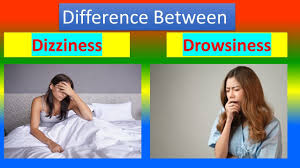Have you ever felt lightheaded or excessively sleepy and wondered whether it was dizziness or drowsiness? These sensations can be confusing, but understanding the difference is essential for managing your health. While both can affect your daily life, they have distinct causes, symptoms, and treatments. Let’s explore how to identify Dizziness vs Drowsiness and when to seek medical help.
What Is Dizziness?
Dizziness is a sensation of being off-balance, lightheaded or feeling like the room is spinning. It is commonly associated with vertigo, which creates the illusion of movement even when you are still.
Common Causes of Dizziness
-
Inner ear problems – Conditions like vertigo, Meniere’s disease, or labyrinthitis can disrupt balance.
-
Low blood pressure – A sudden drop in blood pressure can cause lightheadedness.
-
Dehydration – Insufficient fluids can lead to dizziness.
-
Low blood sugar – Diabetics or those who skip meals may experience dizziness.
-
Medications – Some drugs, such as antihypertensives or antidepressants, may trigger dizziness.
-
Neurological conditions – Migraines, strokes, or multiple sclerosis can cause balance problems.
Symptoms of Dizziness
-
Lightheadedness
-
Feeling faint or woozy
-
Unsteadiness or loss of balance
-
Vertigo (a spinning sensation)
-
Nausea
What Is Drowsiness?
Drowsiness refers to excessive sleepiness or difficulty staying awake. Unlike dizziness, it does not affect balance but rather impacts alertness and cognitive function.
Common Causes of Drowsiness
-
Sleep deprivation – Lack of quality sleep can cause extreme fatigue.
-
Sleep disorders – Conditions like sleep apnea, insomnia, or narcolepsy contribute to daytime drowsiness.
-
Medications – Sedatives, antihistamines, or muscle relaxants may induce drowsiness.
-
Chronic illnesses – Hypothyroidism, anemia, or diabetes can lead to fatigue.
-
Poor diet and lifestyle – High sugar intake, lack of exercise, and dehydration can contribute to sluggishness.
Symptoms of Drowsiness
-
Persistent fatigue
-
Heavy eyelids or frequent yawning
-
Slowed reactions and difficulty focusing
-
Lack of motivation
-
Increased need for naps
Key Differences Between Dizziness and Drowsiness
While dizziness and drowsiness may seem similar, they have distinct characteristics:
-
Dizziness affects balance and coordination, while drowsiness affects alertness and energy levels.
-
Dizziness may cause spinning sensations, whereas drowsiness leads to sluggishness and fatigue.
-
Dizziness is often triggered by inner ear or neurological issues, while drowsiness is linked to sleep or metabolic problems.
When to Seek Medical Attention
Both dizziness and drowsiness can be harmless, but some situations require medical intervention:
-
If dizziness is accompanied by chest pain, fainting, or vision loss – These could be signs of a stroke or heart issue.
-
If drowsiness is sudden, severe, or persistent despite adequate sleep – This could indicate an underlying medical condition.
-
If symptoms worsen over time or interfere with daily activities – Consult a doctor to rule out serious conditions.
Conclusion
Dizziness and drowsiness are two distinct conditions that affect different aspects of your well-being. While occasional episodes may not be concerning, persistent or severe symptoms warrant medical evaluation. By recognizing the causes and differences, you can take proactive steps toward better health and improved daily functioning.
